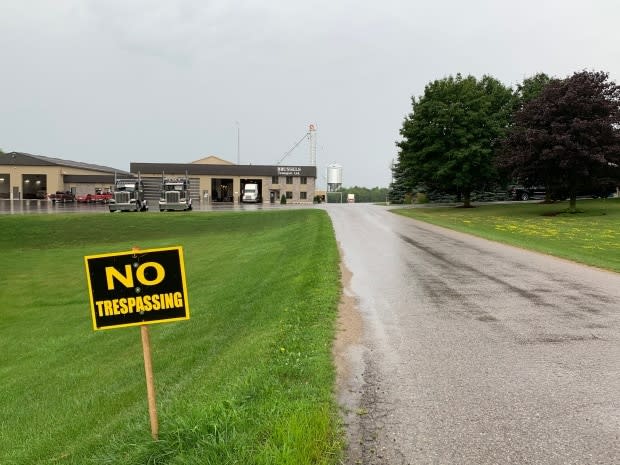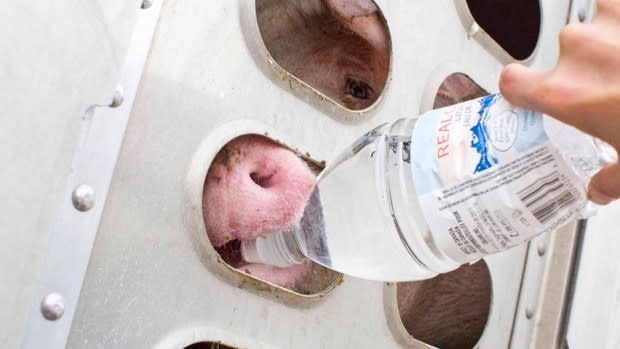Livestock truckers express safety concerns outside Ontario meat processing plants
As the province prepares for public comment on its new food safety law, anti-meat activists and some in Ontario's farming industry agree that tensions are at an all-time high when the two sides meet at protests outside slaughter houses.
It's so tense, the co-owner of the trucking company connected to the death of a woman killed in June at an Ontario processing plant is speaking out for the first time about safety concerns.
One of Tyler Jutzi's drivers at Brussels Transport Ltd. was charged with careless driving after activist Regan Russell's death at Fearman's Pork Inc., near Burlington.
Jutzi, a co-owner of the Bluevale Ont. company, worries that protesters are blocking his drivers from delivering animals to plants and that someone else is going to get hurt.
"With a hundred thousand pound piece of equipment turned into a driveway, there's a lot of blind spots," Jutzi said.

"If the driver turns in and hurts someone, we've seen the consequences. We need to have no one in traffic, none of them surrounding the trailer," said Jutzi.
Russell's family has called for a coroner's inquest and is waiting for the matter to go to court. The trucking company has raised $106,000 to cover the driver's legal and mental health costs.
Counter protesters grilling hotdogs
The meat processing plant where Russell died has become a popular location for protesters holding vigils for pigs on trucks, and is now the site of counter protests.
The demonstrations have become more frequent since Bill 156 was introduced by Agriculture Minister and Oxford MPP Ernie Hardeman in 2019. It received royal assent and passed into law in June.
The controversial legislation limits people from interacting with farm animals or entering processing facilities without consent.
Referring to it as an "Ag-Gag" law, lawyer and Animal Justice Executive Director Camille Labchuk agrees that tensions are escalating and calls it "troubling."

She says activists stand near the plant to bear "bear witness to the animals in their final moments" and to document conditions inside the trucks. For the first time, she said counter protesters are holding their own demonstrations on site as well.
"I've never seen a 'counter-protest' before where farmers, truckers and whoever else show up with offensive signs and grilling hot dogs," she said.
"The fact that Regan Russell was killed only two days after Bill 156 passed into law makes me very concerned about whether the law had anything to do with the trucking industry and the farm community feeling emboldened to take action against animal activists," she said.
'That truck is their workplace'
Both Labchuk and Jutzi say death threats are being exchanged.
"The rhetoric and the hatred toward people who simply care about animals and want to protect them has been ratcheted up to the highest point I've ever seen it," said Labchuk.
But for truck drivers, Jutzi says the vitriol feels different because they have a job to do.
"Drivers are definitely scared," said Jutzi, adding that his responsibility as an employer is to provide a harassment-free work environment for drivers. He said drivers have been compared to Hitler, had doors to their trucks thrown open and been pelted with water bottles.
"That truck cab is their workplace," he said. "I'm supposed to do something about it to stop and prevent these situations."
Police do patrol processing plants, but Jutzi believes better enforcement is needed to keep people away from the trucks.
"We have no objection to protesters," he said. "They have their right to voice their minds, but they need to do it safely."

Bill 156 opens for public input this month
Both the farming community and animal rights activists will be able weigh in on Bill 156 later this month.
A spokesperson with Hardeman's office was not able to provide an exact date but said the intention is to have the law in place by the end of the year.
Labchuk said Animal Justice believes Bill 156 violates people's right to free expression and freedom of assembly, and plans to file a legal challenge once the provincial government finishes drafting regulations.
Jutzi will also be watching the regulations closely.
"I think Bill 156 is the answer to our problems right now, he said. "No truck should drive into a plant worried if they're going to be physically or verbally assaulted, or if someone's going to fall under their trailer."
"But it's a matter of if it's going to be enforced properly."


